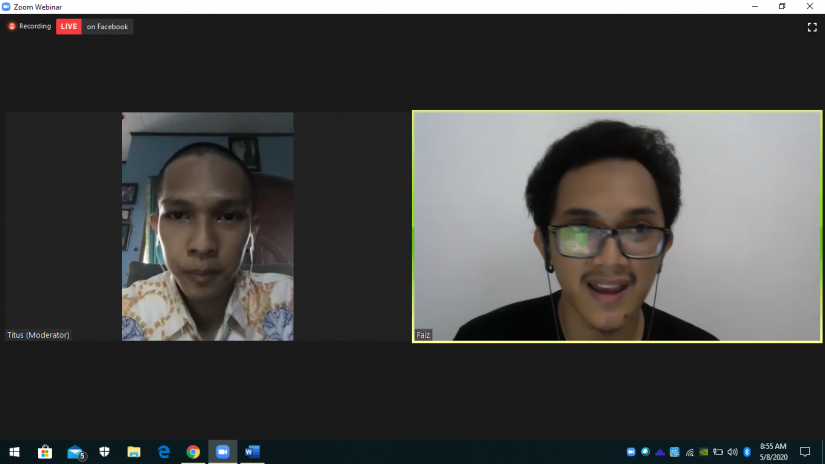
Yogyakarta, May 8th 2020 – Block71 and Waktukita.com together with Creative Hub Fisipol UGM held the second #Dirumahajatalks for Charity in Friday (8/5). #Dirumahajatalks for Charity is an agenda to support a program called Against COVID-19 Together (Bersama Kita Lawan COVID-19) with the open donation on s.id/kitalawancorona. The total sum of funds will be donated to the medics personnel and communities that affected by COVID-19. This time the topic was How Technology is Shaping the Future of Education, the series of #ngabuburitditemenin class which took place on May, 7th – 12th 2020. In this second class, the speaker was Ahmad Faiz Sahupala, the co-founder and CEO of Eduka System and moderated by Titus, Talent Pitching Creative Hub Fisipol UGM Batch 3.
Eduka System is an online test platform that focused on the question training to improve the competency of the Indonesian students. Their products are Eduka PTN, Eduka CPNS, Eduka STAN, and Eduka Quiz. Eduka System started with four college students who frequently participated in competitions, then realized their ideas that concern about education and technology that still had gaps at that time. “From the beginning, it was our big dream to change the level of the education. For the first time it was a government policy about university test regulation, it rarely used computers, started in 2018 it was just 2%. But from the 2019 until now, it was already 100% using computers. There is a technological development in education, in the future there would be many educational systems that will use technology,” Faiz said.
Looking at the problems of education in Indonesia, Faiz explained that the potency of Indonesian students were great, but many of them have not optimized their potencies yet. Faiz considered that there were still many who only focused on memorizing theories but did not pay attention to the application of the theories, only memorizing the theories without knowing how it could be practically useful. “It could be said that in the theoretical aspects, our students could compete. But it could be hard when they found a complex problem. Because they were not used to use that theory practically,” he said.
That statement was supported by the PISA scores data. PISA is an international research to test the literacy skills, mathematics, science, and also to see the student’s competencies in problem solving. Ironically, according to that data, Indonesia placed in the 70th ranking from 77 countries. Literacy competencies are not evenly distributed yet in Indonesia, the focus of student learning is less-effective. This is considered to have implications for the ineffectiveness of technological development, because of the inequality of education in Indonesia.
Due to this pandemic condition, the activities in the education field were implemented online. This condition required educational technology startups to have strategies to take the optimal opportunities. According to Faiz, product concept that used must be as clear as possible because there are new users. With a good product concept and a good service, users would not go away even though the pandemic already over. “We should focus to fix the products and the features that suit the users need, to make them comfortable and would not go away after this pandemic,” Faiz explained.
“For the young generation that have big idea and interested in the technological development and education, what needs to be prepared is the mental. There will be many adaptations that should be done in education, especially in the regulations. We should be adaptive towards the change of regulations which often happens in Indonesia. Other than that, we should lower our ego to learn something new, especially in this time of rapid technological development. The most important is that you want to learn,” Faiz said.
After the discussion with the speakers finished, moderator opened the question and answer session for the audience to make the discussion more interactive. Audience was very enthusiastic to know more about Eduka System and the technological development and education. The discussion was ended at 05.00 p.m.
